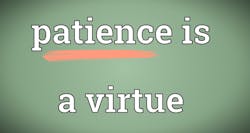Having been a police trainer for more than 20 years causes me to watch cop shows, news, and movies with a critical eye. Reality shows are the worst for me. I watch as some officers involved in pursuits finally get the car stopped only to expose themselves to danger or create dangerous crossfires. While I applaud their aggressiveness and desire to apprehend the subject, I cringe at their poor tactics. We know that any traffic stop is inherently dangerous. Those that involve a pursuit are extremely unsafe since it’s obvious the driver does not want to be apprehended.
Similarly, room and building entries pose the same deadly risk. The fatal funnel is so named because it’s the spot where thugs have the easiest and best opportunity to take us out. Officers that stop within the door opening, or slowly move through it, are at the greatest risk. What causes us to abandon our training and employ tactics that put us and our colleagues in danger? Adrenaline rush for one, not knowing what awaits us inside - someone with a gun or other weapon—or perhaps a victim calling for help. The irony is that if we go down, that person counting on us for help never gets it. It only takes a couple of seconds to make a quick entry plan and proceed cautiously.
Some other behaviors that make me uncomfortable are officers who nonchalantly handcuff individuals. Whether you’re just temporarily detaining them or actually arresting them, placing handcuffs on someone is a moment fraught with potential violence. Anytime someone realizes they are about to lose their freedom their psyche becomes supercharged. The spectrum of reactions varies from one of complete obedience to outright resistance and flight. If you are putting the cuffs on anyone, it should be done quickly and authoritatively. A lackadaisical approach may signal the subject that you’re unprepared for his resistance. It pays to use the same cuffing technique each time, and that also includes removing the cuffs as well. Be safe, cautious, and quick.
Car stops are difficult, particularly for one-man units dealing with multiple occupants. Don’t be reluctant to control drivers and occupants. If warranted, place the passenger in your patrol car after he’s been patted down and cuffed so you can fully concentrate on the driver and vehicle. Never put anyone in your unit without a pat down! Hopefully, you’ve requested backup. Be patient and wait for help to arrive before any vehicle search is conducted, particularly if the driver is acting sketchy. If you’ve run the tag and driver’s name, be aware that if it comes back with a hit, and the subject hears the radio, he’s likely to run at that point.
Most of this is just common-sense police work - things you’ve learned during training or on the job. The problem is that we get so busy and go from 0-100 in seconds that we sometimes like to take the quickest route without regard to safety or sound tactics. Sometimes it’s a good idea to get together with sector cars that usually back each other up and talk about some incidents worked jointly. Ask each other about things that were done well or that have could have been done better. What tactics worked well, and which didn’t. Could we have positioned ourselves or our cars better, or did the situation warrant that we had no other options?
One of today’s big problems is many departments are short on manpower. Little or no time exists for training when officers are working 10 and 12 shifts and sometimes working doubles. Add court into the mix and training time is down to zero. The best option is to get together with colleagues and at least talk about tactics and other problems. Firearms training is another opportune time to put your heads together and discuss best practices. New hires in particular are like sponges and listen to every word seasoned cops talk about. We’ve all been there—we learned from those who preceded us and survived the streets. The academy will never replace working the street, so it’s up to us to bring the newbies along. Remember, these same guys and gals are backing us up. Make sure we give them every tool to keep all of us safe and on our way home after each shift.
Stay Safe, Brothers and Sisters!
About the Author
John Wills
John M. Wills is a former Chicago police officer and retired FBI agent. He is a freelance writer and award-winning author in a variety of genres, including novels, short stories and poetry. John also writes book reviews for the New York Journal of Books, and is a member of the National Book Critics Circle. His new book, The Year Without Christmas, is available now. Visit John at: www.johnmwills.com.

